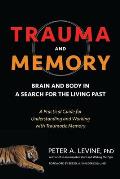Subtitle: Brain and Body in a Search for the Living Past. A Practical Guide for Understanding & Working with Traumatic Memory
The first part of this book is a thorough introduction to different kinds of memories. There are explicit and implicit memories. Explicit (conscious) memories include declarative (like the times table) and episodic (stories with emotional content). Implicit (subconscious) memories include emotional and procedural memories. Implicit emotional memories are “flags.” Procedural memories are impulses, movements, and internal body sensations. Procedural memories can be further divided into skills like riding a bike, hardwired emergency responses, and basic approach/avoidance.
The writing is warm, engaging, informal, and filled with anecdotes.
The second part is an introduction to Levine’s trauma healing method of Somatic Experiencing, with several case studies, some including stills from videos of the sessions.
The third part is rants against more cathartic modalities of trauma healing, including support for the idea of false memories being induced by the “wrong” kind of trauma healing. I have only tentatively recommended Levine’s first book “Waking the Tiger” because it includes a section about false memories, and unfortunately I have to make the same caveat here.
Yes, false memories occur, just like false accusations of rape occur. Neither occur with enough frequency to deserve being addressed at length in a healing book, and both topics do a great deal of harm by undermining survivors’ already fragile hold on their truth.
Levine’s deeper point is to support trauma survivors to listen to their own bodies, and that is a message I can get behind.


Silvia says
Hi Sonia,
I love to read your book reviews and this especially resonates with me. I tried somatic experiencing as therapy form twice (actually the only trauma therapy available in my region) and left twice, feeling belittled and uncomfortable, without being able to address the why. Now your review mentions the way, Levine deals with stories about sexual abuse. And I feel,that explains my discomfort. My stories and ways to make meaning of my past were deemed completely irrelevant in SE.
I now learn slowly to hold space for my stories and thoughts as much as for my sensations and emotions. And to be all inclusive fits my journey so much more.
Sonia Connolly says
I’m sorry to hear about your experience with that, and glad you could listen inside and leave when you needed to. How wonderful to hear how you’re holding space for yourself. Best wishes for continued healing!
Anna Holtzman says
Dear Sonia, thank you so much for pointing out this seldom discussed aspect of Levine’s work. I’ve also written about his support of the harmful “false memory” rhetoric in an article that I’d love to share with you here:
https://medium.com/fourth-wave/harvey-weinsteins-false-memory-defense-and-its-shocking-origin-story-2b0e4b98d526
I am trained in Somatic Experiencing and find the modality to offer a great deal of value to the healing journey, but the “false memory” rhetoric that Levine and some of his followers espouse needs to be called out. Thank you for doing so.
Very best,
Anna
Sonia Connolly says
Hi Anna, thanks for dropping by. Yeah, the whole FMS thing is infuriating, to say the least. I took a look at your blog and appreciated the video by Chanel Miller.